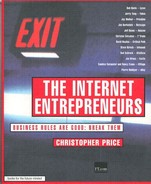The Priceline concept
When Priceline launched in April 1998, the concept appeared at once ludicrous and intriguing
When Priceline launched in April 1998, the concept appeared at once ludicrous and intriguing. The company invited visitors to its website to bid the price they wanted for airline tickets. The customers got cheap seats, the airlines flew full, Priceline took its commission and everyone was happy.
With US airlines flying with 500 000 empty seats every day, Walker thought it was a sure thing. He was wrong. His lack of reputation in the notoriously closed world of the airlines and a booming economy prompted a cool response from the industry:
'They just would not buy Priceline as a solution. But they get a lot of people coming to them saying, "Hey, you've got a problem and I can fix it for you." And the good ideas and the bad ideas don't sound so different.
'What they were essentially saying to us was that they did not believe that we were going to be a significant player, because in their experience very few people outside of the industry ever get to a prominent position.'
The airlines were also fearful that Priceline would become a rival internet destination to their own websites. They saw the internet as an ideal opportunity to sidestep the established distribution system of travel agencies. Then, explains Walker:
'Priceline comes along and tells the airlines, we're going to create a marketplace where we're going to decide which customers they get and at what price. To which they replied, we're not at all excited about that - we'd rather they just came directly to us.
'But we told them, if they come to you, you can't give them the price they want because that would destroy your price integrity. You need someone like us to serve as a shield for your pricing and therefore serve as a brand and a price.'
The message fell on deaf ears. But Walker is understandably forgiving in hindsight: 'They didn't behave unreasonably towards us. In fact, with the exception of one airline, all the others sent teams of people to see us.' Walker continues:
'I talked to virtually every senior executive in the airline industry and I found them to be remarkably concerned about the changes in their industry and the effect the internet was going to have.
'They were simply not thrilled that Priceline was going to deal with customers in a completely new way. I can't say I blame them.'
The result was agreements with just two smaller airlines - TWA and America West - and a business looking in a forlorn state, even before it had launched. Walker decided to start the service anyway. 'I took an enormous risk launching Priceline, both personally and as a company. It took a lot of guts,' he says with characteristic honesty and immodesty.
Walker's gamble was that even if Priceline could not fulfill many of its customers' ticket requirements, the demand would be so great that the airlines would come to their senses and sign up.
Some $15 million was earmarked for the marketing campaign and, in typical Walker style, the 'chief innovator' persuaded Captain Kirk from 'Star Trek' to lead it. In fact, the actor William Shatner refused at first to meet with Walker, who was forced to pay him an appearance fee so that they could meet in a Manhattan bar. One can only picture the scene: the portly but smooth Shatner boldly going on a journey into Walkerworld where no other man had gone before. Within half an hour, Shatner had waived his $500 000 campaign fee in favor of stock options. These are now said to be worth some $7.5 million.
In reality, the system was not such a bargain for customers
Priceline launched in April 1998 with Shatner reading the Walker-written scripts in radio broadcasts inviting customers to name their own price for airline tickets. In reality, the system was not such a bargain for customers. The airlines - admittedly only the two that had initially signed up - would offer seats to Priceline at discount prices, usually on off-peak flights, and often involving a stop-off. Priceline would then match the seats with what customers were willing to pay: if the two did not match, or Priceline did not make money on the transaction, the customer went away empty-handed.
Nevertheless, Walker guessed right - the response was overwhelming, with more than one million Americans trying to buy tickets. However, in order to satisfy even a small proportion of these, Priceline was forced to break its own rules and buy tickets on the open market, often above the level being named by customers. Only around one in 14 customers succeeded in getting a ticket in the first six months of Priceline's operations, and the company was also forced to subsidize each ticket by an average of $30 each.
Paying people to fly? It was an enormous gamble in terms of both building up the business and brand and forcing the airlines to the negotiating table. Three months after launch and with the company hemorrhaging cash and still with only a handful of airline partners, the critics were licking their lips.
But Walker is nothing if not nimble. He desperately needed to bolster Priceline's credibility, and in August 1998, persuaded Richard Braddock, a former president of Citicorp, to take the job of chairman and CEO. Walker stepped aside to vice-chairman. Braddock was rewarded with a hefty 10 percent of Priceline's stock.
